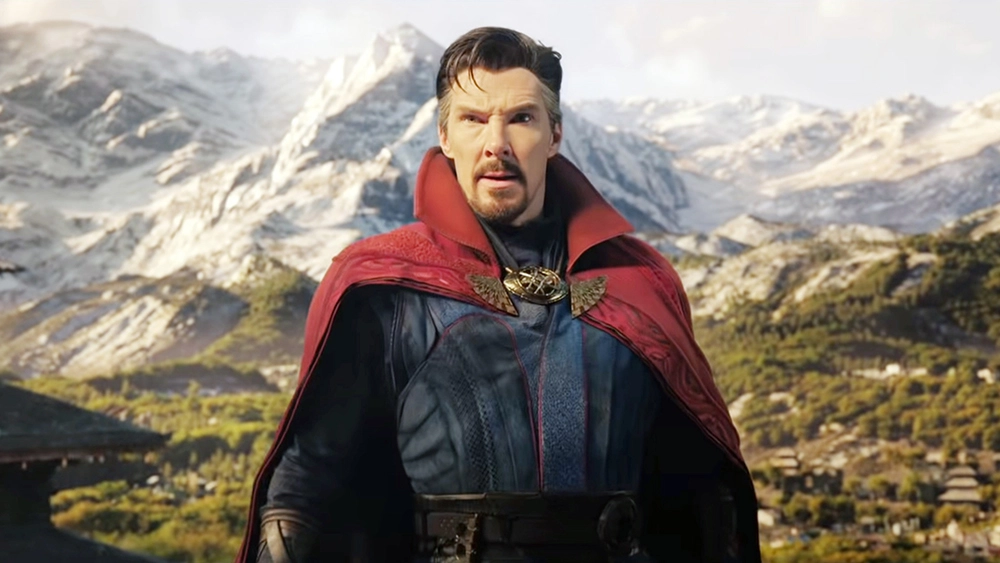
In one of the many memorable moments in Sam Raimi’s Spider-Man, an enraged Willem Dafoe murders a subordinate scientist who stubbornly insists that they need to take a dangerous chemical concoction “back to formula.” Things may not have turned out well for that underling, but in the two decades since Spider-Man’s release, it’s clear that his cold-blooded logic—the insistence on safety and reliability at the expense of risk and creativity—has earned the last laugh. The Marvel Cinematic Universe, now 14 years and 28 films and several zillion dollars into its reign as the planet’s most ruthless profit-generating machine, is undeniably a product of formula. It is a carefully balanced equation, a recursive system scrupulously designed to serve its fans, perpetuate its merchandise, and—on occasion—make some pretty decent movies. The challenge for any director working within this rigorously controlled franchise is whether they can smuggle their own sensibility—their own spiky and distinctive flourishes—into an enterprise that, by its very nature, flattens personal art into corporate entertainment.
So I am pleased and maybe a little bit to surprised to report that Raimi, the man who created the original Spider-Man trilogy and is arguably (albeit inadvertently) responsible for our current state of cinematic homogeneity, has risen to this challenge with élan and aplomb. To be sure, Doctor Strange in the Multiverse of Madness, Raimi’s first feature in nine long years, is decidedly an MCU production. There are callbacks and cameos and teases and terminological mouthfuls and stale jokes and weightless scenes of computer-generated spectacle. But when he isn’t dutifully hitting these franchise marks, Raimi is sprinkling the margins and filling in the cracks with his own playful, eccentric touches. If the movie isn’t quite a Sam Raimi classic, it at least exhibits glimmers of classic Sam Raimi.
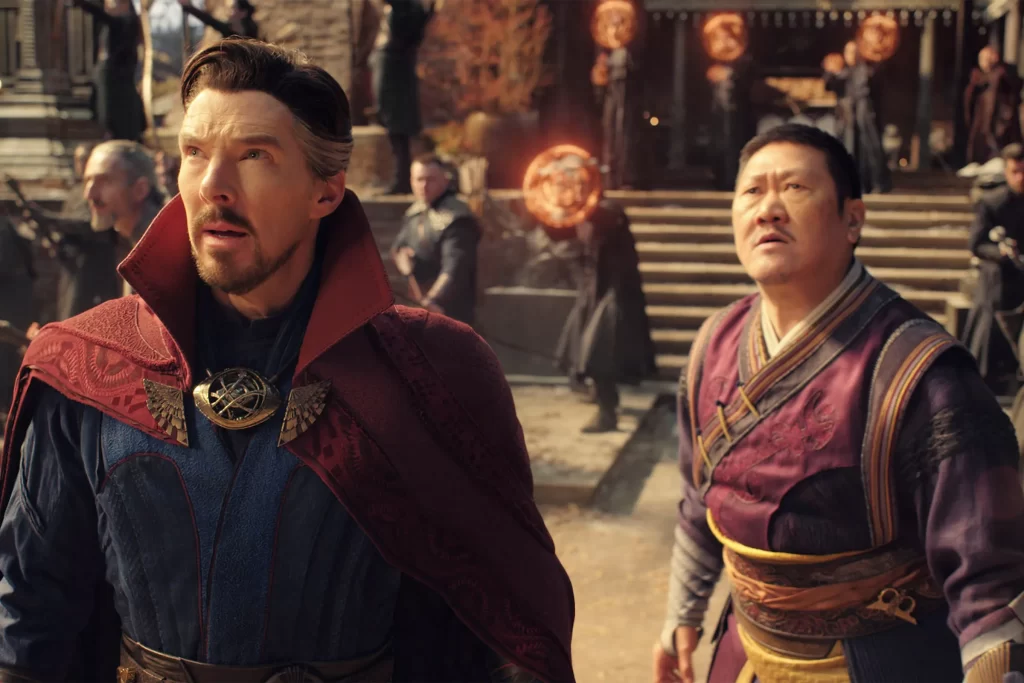
Despite being a superhero vet—before Spider-Man, he delivered the wonderfully weird Darkman—Raimi’s true calling lies at the intersection of horror and comedy. Multiverse of Madness, the sequel to Scott Derrickson’s 2016 film which integrated the eponymous surgeon into the MCU, fulfills neither of these genres; it isn’t especially scary, and it’s even less funny. But it nonetheless possesses a gleeful visual imagination—an impish flair that hovers between seductive and perverse—that happily distinguishes it from its Marvel brethren. Raimi is less interested in developing his characters or even telling a lucid story so much as providing an immersive and sensory experience.
And so: In one early sequence, a pastoral, blossom-strewn bliss is revealed to be an illusion, melting away in favor of an eerie graveyard that pulses with sepulchral red light. Later, a woman’s internal trauma is externalized as a claustrophobic pile of rubble, trapping her within the terror of her own thoughts. When two doppelgangers battle one another, they exchange not punches or fireballs but musical notes, weaponizing the symphonies of Beethoven and Bach into deadly glowing chords. And in an inspired touch yanked straight out of Army of Darkness, our hero reanimates his own corpse, puppeteering a decrepit, zombified version of himself that saunters into combat with fetid flesh and a sneering grin.
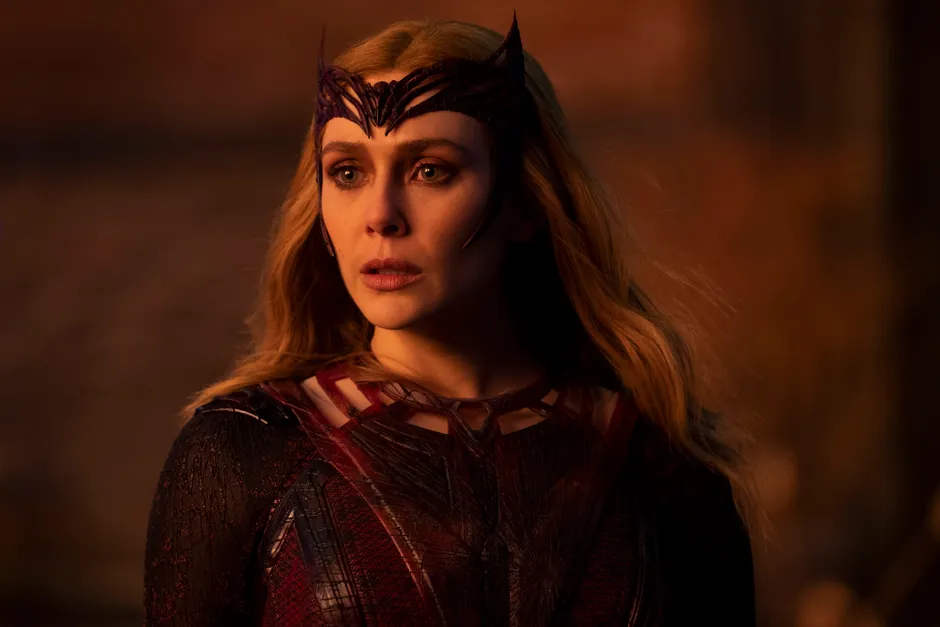
That hero, in both mortal and cadaverous form, is of course Stephen Strange (Benedict Cumberbatch), the doctor-turned-sorcerer who spends most of his time safeguarding the world from various extraterrestrial threats and occasionally joins forces with Spider-Man (not Raimi’s, the other one) and the Avengers. Strange’s origin story turned him from a preening medical showboat into a more solemn universal sentry, and while Cumberbatch can still arch a quizzical eyebrow and deliver an acid quip, he can’t avoid the character’s lapse into dullness. Strange’s past selfishness may have been familiar, but it at least provided him with an appealing arc; now, he’s just another bland good guy.
To the extent that Multiverse of Madness contains an emotional core, it derives from Wanda Maximoff, the fearsomely powerful enchantress played with sly menace by Elizabeth Olsen. Fresh off of gaining and losing a television family on a fake television show that formed the backbone of a real television series (look, it’s complicated), Wanda wants her kids back, and her single-minded desire to regain her motherhood transforms her from Strange’s wary ally into his very dangerous enemy. Unlike in WandaVision, Raimi doesn’t capitalize on Olsen’s gift for light comedy, but he does tap into her roiling intensity, resulting in the MCU’s most disturbingly human villain since Michael B. Jordan snarled his way through Black Panther. Wanda looks intimidating enough when she dons her red amulet and becomes the Scarlet Witch, but she’s never more frightening than when she’s in plain clothes, striding through an alternate universe with blood smeared on her face and bad intentions in her heart.
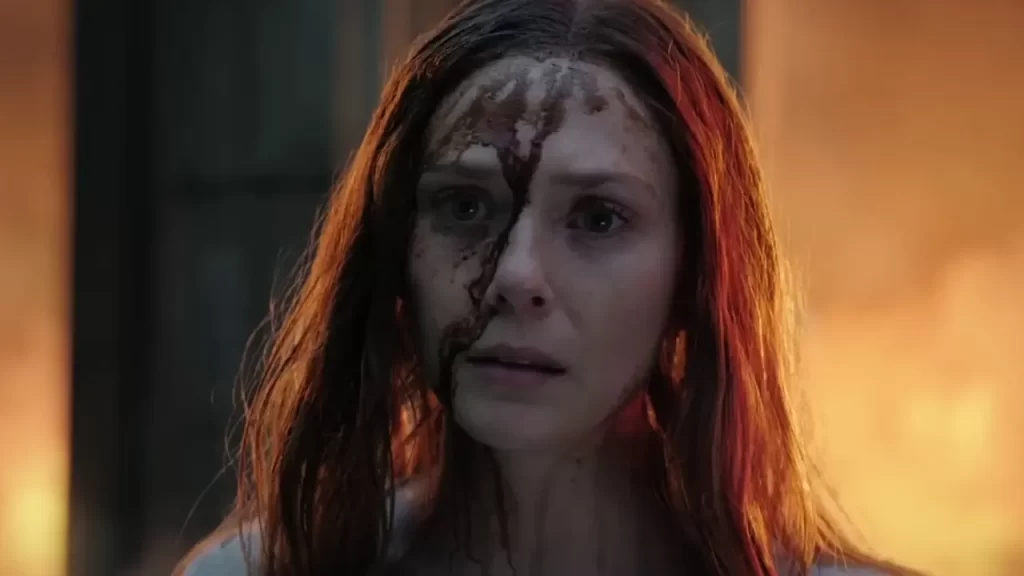
“This is me being reasonable,” Wanda chillingly intones before laying waste to an ancient village. Reason, however, is of limited value to Raimi; having previously mastered the comic-book genre’s potential to function as a coming-of-age allegory in his Spider-Man pictures, he now views it as an avenue for oddness and experimentation. The plot of Multiverse of Madness—in which Strange must protect a wayward intergalactic traveler named America Chavez (Xochitl Gomez) from Wanda’s clutches, and in so doing track down multiple literary MacGuffins with ominous names like the Darkhold and the Book of Vishanti—is incomprehensible and boring. It is also, under Raimi’s savvy stewardship, largely beside the point.
The concept of the multiverse, in which virtually anything can happen, is both a boon and a bane to filmmakers; the possibility of limitless invention can also produce paralysis, indiscipline, and incoherence. Raimi isn’t immune to these pitfalls. The opening sequence here, which finds Strange and America scrambling through a multicolored dreamscape while being pursued by a ravenous demon, is a faintly disastrous approximation of videogame-style chaos, and while an early street-level battle against a marvelously ugly giant octopus flashes some actual kinetic energy, most of the action scenes are prone to tedious CGI and intangible blasts of lightning. (Certainly they lack the combination of messiness and precision that Daniels recently brought to Everything Everywhere All at Once.) Yet while this problem has submarined many superhero directors (most recently Chloé Zhao in Eternals), it feels incidental here, especially when compared against fabrications like Memory Lane, a storefront where people can pay to relive their happiest days and worst nightmares. Hell, how many franchise films make room for a secondary baddie who lives in a decrepit castle that looks like a celestial variation on Xanadu from Citizen Kane? (The production design, by Charles Wood and Md Joni Hossain, is consistently impressive.)
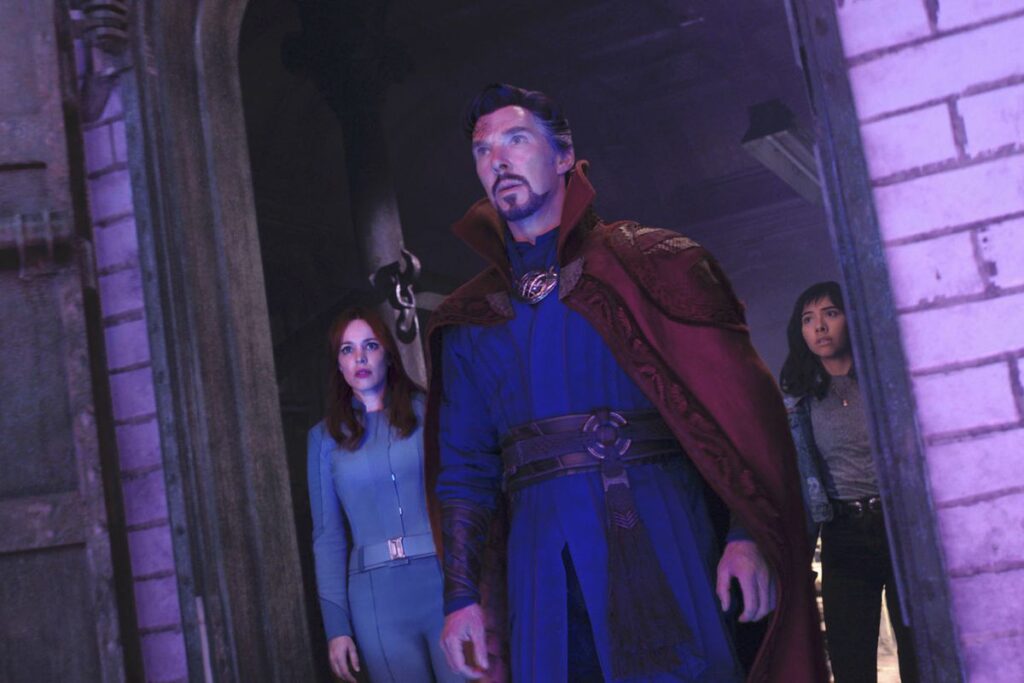
And even if Multiverse of Madness, which was written by Loki showrunner Michael Waldron, can’t fully escape its commercial imperatives of references and continuity, it manages to land some jabs at those same imperatives. Perhaps its boldest and most mischievous conceit is to assemble an alt-universe version of the Avengers—featuring repurposed secondary characters like Hayley Atwell’s Peggy Carter, Lashana Lynch’s Maria Rambeau Captain Marvel, and a few other famous faces likely to get fanboys salivating—only for Wanda to utterly decimate them when she activates Terminator mode. The ending, rather than obediently teeing up a forthcoming installment, instead delivers a nasty rug-pull that recalls the famous final shot of The Evil Dead. And speaking of which, Raimi bestie Bruce Campbell centers the post-credits scene, a hilarious gag that mocks the very notion of post-credits scenes.
None of this makes Doctor Strange and the Multiverse of Madness a great movie. Its laugh quotient is oddly low—as a sample of its groan-worthy dialogue, when Strange learns that a band of warriors is called the Illuminati, he responds, “The Illumi-whattie?”—and it lacks the sincere heartbeat that throbbed beneath the Spider-Man films; Rachel McAdams may return as Christine Palmer, but her putative romance with Strange is even less persuasive this time around. Yet it exhibits a different sort of sincerity in its relentless style and freewheeling innovation. Aided by Danny Elfman’s vigorous score, Raimi has made a comic-book movie that feels truly imaginative instead of one that coasts on its connection to intellectual property. It tilts and whirls and stumbles and soars, pulling you from one bizarre universe to the next but always ever deeper inside its director’s gloriously demented brain.
Grade: B
Jeremy Beck is the editor-in-chief of MovieManifesto. He watches more movies and television than he probably should.
